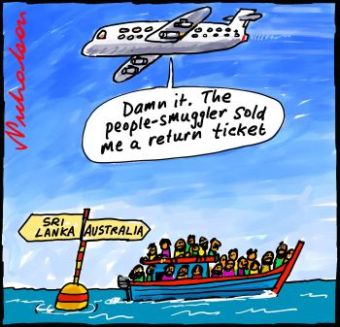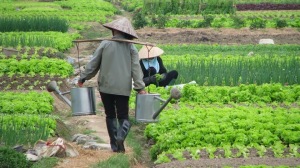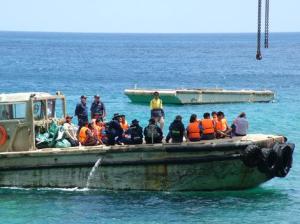Since the public was first made aware of the 153 Tamil asylum seekers who were on a leaky boat off the coast of Christmas Island, the Australian Government has refused to provide further information about the fate of the boat. Today however, more troubling reports are emerging about the fate of the Tamil boat, and the Australian Government is remaining silent.
“We are experiencing huge waves and very bad conditions”, came the call from a man on board the boat. “We are very afraid and at threat. We have only three litres of water left. We can only manage for today, and tomorrow we will have nothing to drink.”
There were 37 children on board, two were sick with vomiting, fevers and headaches.
Since Saturday little more has been made known about the fate of the boat and Immigration Minister Scott Morrison has continued to treat the Australian public with contempt. He refused to comment on the situation, as “no boats have arrived”, explaining that the government’s policy is that it does not comment on on-water activities in relation to Operation Sovereign Borders. “I am advised that I have no such report to provide to you today”.
But last night new and disturbing reports emerged that the silent boat has been handed over to the Sri Lankan military.
Has Australia committed a deliberate breach of the Refugee Convention?
By failing to allow people to lodge their claim for asylum and sending them back to a country where they may face persecution, Australia could be stepping over a line – breaking international law and the Refugee Convention.
The Refugee Council of Australia has released a statement saying, “As a Refugee Convention signatory, Australia has a clear obligation not to send asylum seekers back to danger without giving them a chance to put their case for refugee protection.”
In international law there is a term called non-refoulement, which forbids the return of a person to a country where they are at risk of persecution.
And Tamil people in Sri Lanka are at risk! In fact, according to the UN Working Group on Enforced or Involuntary Disappearance, Sri Lanka is ranked second for unexplained disappearances of civilians, second only to Iraq.
Returning a group of people at risk of  persecution, demonstrates an outright and blatant disrespect for international law by the Australian Government.
persecution, demonstrates an outright and blatant disrespect for international law by the Australian Government.
What’s more, it is a clear indication of the true objectives and interests of the Abbott Government. If ‘saving lives at sea’ was the ultimate objective of Operation Sovereign Borders, then wouldn’t that concern extend to the lives beyond the threat of drowning at sea. Nauru and Manus Island OPCs act as deterrents to boarding a boat to Australia, but the Government maintains the argument that Offshore Processing is a necessary deterrent to ensure no one takes a risky boat journey to Australia. But how does sending people back to a place where they could be imprisoned, tortured and even killed pertain to the objectives of saving lives at sea’? Just as rescuing a person from shark infested waters by placing them in a jungle with leopards is not a safeguard against death, just a removal from a certain kind of death, rescuing people from the ocean and returning them to their former place of persecution does little to protect their lives.
It does however protect our borders. And at the end of the day, that is what is important.
This latest chapter in the ongoing Morrison vs. Asylum Seekers war is perhaps the darkest. If these reports are confirmed to be true, what has happened will open Australia up to international criticism, as the country that has blatantly ignored the international obligations of the Refugee Convention.

